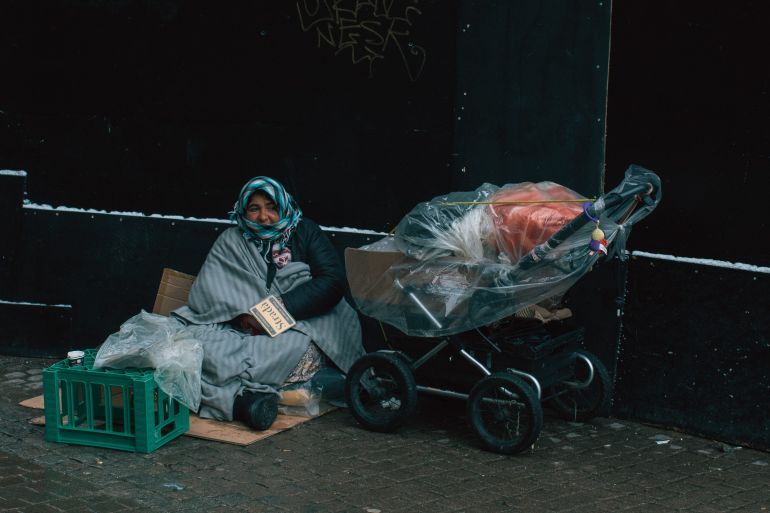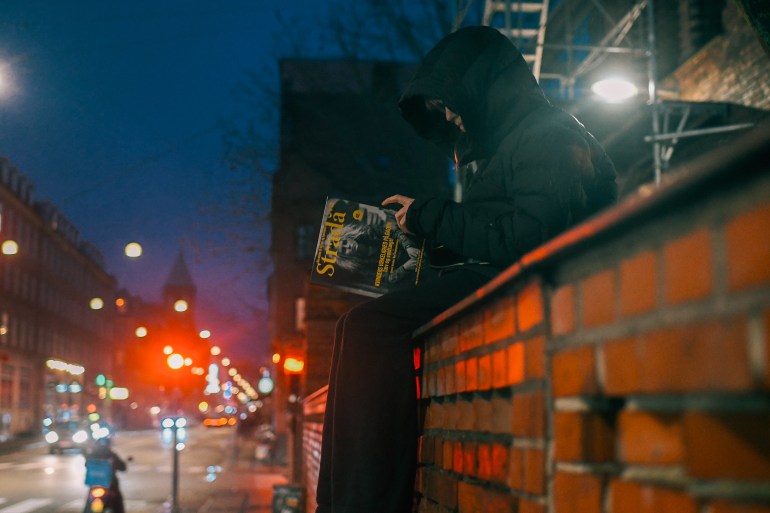Denmark’s tough laws on begging hit Roma women with few other options
Members of the Roma minority face discrimination in Denmark. Those who turn to begging are criminalised.

Copenhagen, Denmark – On a frigid morning in Copenhagen, Loredana rests on a chair inside a busy shelter for homeless people and drug users.
People are chatting all over, but she’s alone in a corner, hands over her lap. She’s wearing a billowy skirt, several layers of thick sweaters, and a windbreaker, which envelop her tiny frame. Deep wrinkles cover her face at the age of 25.
Keep reading
list of 4 itemsRoma pushed to turn on Ukrainian refugees in Czech Republic
Another Roma boy dies in police chase, marking grim pattern in Greece
‘My father didn’t beat my mother in a gypsy fashion-he just beat her’
A shopping cart beside her overflows with a stack of soaking-wet magazines.
“I can’t sell them anymore,” she says in a quiet voice.
Loredana is partially mute and deaf – so it takes some time to understand, and to be understood.
“How will I be able to buy food?” she asks, throwing her hands up in frustration.
Like many Roma women in Copenhagen, she is here with her husband while the rest of the family is back home, in Romania.
Across Eastern Europe, most Roma families live below the poverty line. Some move west hoping to remit money back to their relatives.
“I have four children in Romania,” Loredana says. “My parents are taking care of them while we are here.”
But getting work has been challenging.
She is illiterate, like 20 percent of Romani are on average. Being deaf and mute doesn’t help, and on top of that, there’s the discrimination.
Across Europe, the Roma are the most vulnerable and stigmatised minority.
In Denmark, a 2019 study found that the ethnic minority is positioned as “lacking any useful qualities” in policy and media discourse. This leads to limited access to the Danish labour market. An administrative “Catch-22” creates another barrier.
In Denmark, some employers and landlords will ask for a social security number before they offer jobs or homes. Yet getting that number depends on having an employment contract and an address in the first place. As a result, low-skilled migrants like Loredana get pushed into homelessness, with few options for work.

Some Roma women in Copenhagen collect bottles to deposit at return centres in exchange for cash.
Others like Loredana sell a magazine called Strada, or Street, which is exclusively sold by street-based people, much like the United Kingdom’s The Big Issue.
Homeless people pay 20 kroner ($2.91) per magazine and sell it for 40 ($5.83) — earning 20 kroner in profit.
Loredana reaches into the folds of her jacket and pulls out a court order, which has a recommendation to deport her in the last paragraph.
The crime that led to this threat? Sitting in front of a grocery store, reaching out her hands, and saying “please” and “food” to passers-by.
In legal terms: Loredana violated Section 197 of the Danish criminal code, which prohibits begging despite a warning. She was also in front of a supermarket – which is an “aggravating” circumstance.
The warning in question came after a police officer told Loredana to stop. It is her second time breaking that same law.
“The first time, they sent my husband and I to jail,” she explains. “We got out recently.”
She tucks away the court order and next pulls out a photograph of an ultrasound scan. She rubs her belly.
“I’m a few months pregnant,” she says.
In fact, she was visibly pregnant when she was jailed.
Banning begging means banning Roma
“Denmark is one of the European countries with the harshest begging laws,” says Pia Justesen, a human rights lawyer who has researched several begging cases in recent years.
“Only Hungary has similar laws matching their level of severity.”
In 2017, Denmark’s justice minister at the time, Soren Pape Poulsen, said he aimed to “get rid of the Roma”.
That year, Denmark passed a set of laws explicitly targeting “foreign visitors” on the country’s streets.
It outlawed “insecurity-creating” camps of homeless people; implemented a zoning ban; and toughened its existing law against begging.
“Begging has been illegal here for hundreds of years. But in 2017, the parliament decided to get rid of so-called ‘intimidating’ begging’,” Justesen explains.
“If you beg in one of four places – on a pedestrian street, in front of or in a supermarket, on public transport or in a train station – it is automatically considered ‘intimidating’. You don’t have to be intimidating in your behaviour: it’s only about the location.”
Before 2017, begging, if caught, would be followed by a warning. Now, the punishment is 14 days of unconditional jail time for “intimidating” begging – as a first offence.
These measures impact members of the Roma community, but Justesen says Denmark has not done enough to raise awareness about its laws.
“There are plenty of cases where people have sat on a plastic box with a paper cup in front of them and have been convicted — even if they weren’t reaching out to passersby or even looking at them,” Justesen says. “With the begging law, you can be passive and still get convicted.”
It’s estimated that in Copenhagen, about 62 percent of homeless people are Danes.
While there are no reliable numbers available for those who self-identify as Roma, from 2017 to 2023, Romanians and Bulgarians made up 84 percent of individual begging convictions in Denmark.
Criminalising homelessness, compromising reproductive care
For pregnant Roma women, poverty increases the risk of obstetric complications. The begging law criminalises one of the only options Roma women have in Denmark to earn money and in turn, this severely affects their reproductive health.
“When it comes to reproductive healthcare, such as receiving prenatal or antenatal care, Romani women experience a pervasive lack of access,” says Bernard Rorke, advocacy and police officer at the European Roma Rights Centre.
While Danish residents are entitled to care through the public system, undocumented migrants like Loredana can only access healthcare at state-run hospitals and clinics if their conditions are considered acute.
Pregnancy on its own is not considered an acute condition. In the Danish Health Act, that term only applies to pregnancies carried outside of term and the physical act of giving birth.
“The main challenge is that due to the Health Act, we can’t always give the women who come see us pre or postnatal care,” says Ditte Dandanell Bihl, head of national work at Caritas Denmark.
The NGO runs a health clinic that admits anonymous patients in Copenhagen. “Moreover, our staff of volunteer doctors experience confusion around what counts as ‘acute’,” Bihl says. “They aren’t always sure whether a woman’s condition is serious enough to direct her to the state-run healthcare system.”
In 2017, the United Nations Committee on the Rights of the Child recommended that Denmark provide full access to healthcare for undocumented children and pregnant women. The UN Committee on Economic, Social and Cultural Rights followed suit with the same recommendation in 2019.
But the legislation remains the same.
“For racialised women like Romani women, there is a disruption inherent to the begging law. That disruption exacerbates any poor health conditions, and is particularly damaging for women with family responsibilities,” Rorke adds. “And incarceration radically disrupts everything, not to mention the toll it takes on mental health.”
International institutions have routinely critiqued the begging law. For example, in 2021, the UN High Commissioner for Refugees urged Denmark to repeal it, to no avail. In 2023, a European Union-wide network of lawyers submitted a third-party intervention to the European Court of Human Rights — arguing that Denmark’s ban on begging is illegal. They are currently waiting for the court to issue its judgement on the case.
“What bothers me,” says Justesen, “is that we’re trying to solve social problems by putting people in jail.”